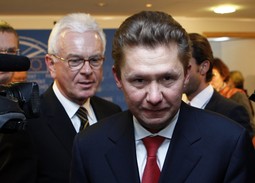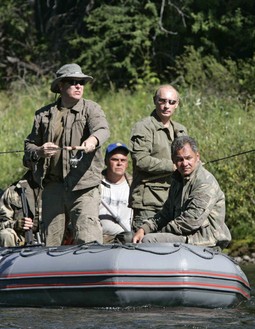Published in Nacional number 712, 2009-07-07
GAZPROM'S offer of the century
Omisalj to be the chief oil exchange in the Mediterranean
THE CROATIAN COMPANY Janaf will, in partnership with Gazprom Neft set up an Adriatic spot market in Omisalj, an exchange on which Russian and other oil will be traded
 ALEXEI MILLER, CEO of Gazprom, a Russian state-owned energy firm, and one of the most powerful people in Europe - the flow of Russian oil and natural gas to the European Union depends on him, in which Omisalj could now get a key roleThe Croatian port of Omisalj could soon become the hub of the oil trade in the western Mediterranean, and the chief partner to the Croatian firm Janaf in the project will probably be the Russian state-owned oil company Gazprom Neft. The two companies have launched talks on the formation of an Adriatic spot market, a kind of oil exchange, where international buyers will be able to take delivery of oil immediately after a transaction is closed and transport it to their destination of choice. The key to the successful functioning of this kind of market is constant access to merchandise, i.e. reliable supply. And that is what Gazprom Neft should secure.
ALEXEI MILLER, CEO of Gazprom, a Russian state-owned energy firm, and one of the most powerful people in Europe - the flow of Russian oil and natural gas to the European Union depends on him, in which Omisalj could now get a key roleThe Croatian port of Omisalj could soon become the hub of the oil trade in the western Mediterranean, and the chief partner to the Croatian firm Janaf in the project will probably be the Russian state-owned oil company Gazprom Neft. The two companies have launched talks on the formation of an Adriatic spot market, a kind of oil exchange, where international buyers will be able to take delivery of oil immediately after a transaction is closed and transport it to their destination of choice. The key to the successful functioning of this kind of market is constant access to merchandise, i.e. reliable supply. And that is what Gazprom Neft should secure.
And while every spot market, including this one, is conceived as a place where the goods of various sellers from various sources is sold, it is not hard to conclude that the arrival of Gazprom Neft would see it take the lead role in the supply of oil to the market. A project of this kind, based on the collaboration of Janaf and the Russian state-owned company, is a continuation of sorts of the never realised DruzbAdria project, which would have seen Omisalj become one of the main Mediterranean ports for the export of Russian oil.
Nevertheless, while the DruzbAdria project would have seen Omisalj reduced to a loading port, with meagre transit earnings, the formation of a spot market could prove to be an important factor in the economic development of the entire Rijeka-Primorje County area. All of the trade that would take place in Omisalj would be subject to Croatian laws, including taxation, on the basis of which the local community, and the country as a whole, could earn a solid profit. On the other hand Croatia would secure a stable supply for the domestic oil market, and the presence of multiple sellers would probably make the price of crude oil significantly lower than it is presently in Croatia. And finally, an oil exchange in Omisalj can be considered a strategically important resource because with its establishment Croatia would become a strong player in the supply and transport of oil in all of Southeastern Europe. The fact that this kind of project will be set up in Omisalj is not surprising given that this port is one of the best locations of its kind in the entire Mediterranean. Unlike most other ports, namely, Janaf's terminal in Omisalj meets all conditions for the docking of ships in the VLCC (Very Large Crude Carrier) class, the world's largest oil tankers.
These tankers often have a capacity of up to 500 thousand tonnes, which is important to oil traders because the use of ships of this size in the final tally reduces the cost of transporting the oil. But to dock them requires very deep ports, and protection from winds, and Janaf's terminal meets both requirements. On the other hand, an Adriatic spot market could not be set up had Janaf not invested heavily in the development of its infrastructure in recent years. Janaf has already met the basic technical preconditions for the operation of an oil market with the modernisation of its oil pipeline, which is now reversible. That means that oil can be transported from Omisalj northwards, but also southbound to Omisalj, which practically secures the Adriatic spot market the option of supply from two different directions. And Janaf has already started building new storage facilities that should double its storage capacity, meaning that the company would have 1.5 million cubic metres of storage space just in Omisalj in a few years time. Janaf received most of the necessary funds, through recapitalisation, from the Croatian Agency for Mandatory Oil and Oil Derivatives Reserves (HANDA).
 PUTIN'S MAN Sergey Shoygu visited Zagreb in September of 2008 in connection with the Omisalj projectThis created the technical conditions for the realisation of the project, and if a deal is achieved on the entry of Gazprom Neft into the project, the top people at Janaf have only to arrange the arrival of the world's major oil traders such as Glencore, Vitol, Bunvor and Litasco. But, even though this is first and foremost a business venture, setting up an oil exchange in Omisalj will be difficult without a bilateral agreement between Croatia and Russia. Besides, Janaf is in majority state ownership, and Gazprom Neft is the oil subsidiary of the Russian state-owned natural gas giant Gazprom, so that it is quite clear that the companies would not launch negotiations without consulting their owners. In that context it is clear why Deputy Prime Minister Damir Polancec has over the past year publicly stated that the DruzbAdria project could be revived. The project was conceived back in the time of the coalition government led by Ivica Racan, when a bilateral agreement was even signed on an oil pipeline that would link the Russian city of Samara with Omisalj. It was on the basis of that agreement that Janaf's oil pipeline was integrated with the transport systems of Russia, Ukraine, Belarus, Hungary and Slovakia, so that Russian oil could be delivered to the island of Krk and loaded on tankers there.
PUTIN'S MAN Sergey Shoygu visited Zagreb in September of 2008 in connection with the Omisalj projectThis created the technical conditions for the realisation of the project, and if a deal is achieved on the entry of Gazprom Neft into the project, the top people at Janaf have only to arrange the arrival of the world's major oil traders such as Glencore, Vitol, Bunvor and Litasco. But, even though this is first and foremost a business venture, setting up an oil exchange in Omisalj will be difficult without a bilateral agreement between Croatia and Russia. Besides, Janaf is in majority state ownership, and Gazprom Neft is the oil subsidiary of the Russian state-owned natural gas giant Gazprom, so that it is quite clear that the companies would not launch negotiations without consulting their owners. In that context it is clear why Deputy Prime Minister Damir Polancec has over the past year publicly stated that the DruzbAdria project could be revived. The project was conceived back in the time of the coalition government led by Ivica Racan, when a bilateral agreement was even signed on an oil pipeline that would link the Russian city of Samara with Omisalj. It was on the basis of that agreement that Janaf's oil pipeline was integrated with the transport systems of Russia, Ukraine, Belarus, Hungary and Slovakia, so that Russian oil could be delivered to the island of Krk and loaded on tankers there.
The oil pipeline's initial capacity was to have been five million tonnes a year, and grow over time to a maximum capacity of 15 million. The project met very quickly with a negative public reaction. The project was criticised for offering low profitability, and the fact that greater tanker traffic increased the possibility of an accident and ensuing ecological catastrophe. The issue of ballast waters was characterised as a particular problem. In order to ensure safe sailing and to maintain stability when not carrying a cargo, oil tankers have to fill some of their storage compartments with water, which they discharge when they come into the harbour where they take on cargo. Considering that the ballast water is often from the other side of the world, it contains microorganisms that do not exist in the Adriatic Sea, and which could lead to the destruction of indigenous submarine flora and fauna. Environmentalists, who lead the protests against DruzbAdria, insisted that the quantity of ballast waters from Russian tankers would be devastating to the waters of Kvarner Bay, the Church also came out officially against the project on several occasions, while among politicians the chief opponent of DruzbAdria project was the future Croatian Prime Minister Jadranka Kosor.
With the accession of the HDZ to power in 2003 the project was shut down, and two years later Croatia announced officially that it was backing out of the project. Nevertheless, just a few years later, the opinion was again present in Government that the project could be useful to Croatia. On the other hand, the interest of the Russians was still present, but in a much smaller measure than was once the case. The reason was in the fact that the situation had changed significantly between 2003 and 2006. Russia had been interested in Omisalj as a port of export above all because of problems with export from its Black Sea ports on the Mediterranean, and because of the attempts by Turkey to limit the passage of Russian tankers through the Bosporus and the Dardanelles. In the meantime, however, Russia has significantly increased the capacity of its export port of Primorsk on the Baltic Sea, and had resolved the problem with Turkey through an agreement on the construction of an oil pipeline between the Bulgarian Black Sea port of Burgas and the Greek coastal city of Alexandroupolis on the Mediterranean Sea. In that context the interest of the Russians for the revival of the DruzbAdria project has these past years been less than it was at the beginning of the decade.
 ANTE MARKOV, CEO of the Jadranski naftovod Adriatic oil pipeline companyMembers of Croatian Government have, however, spoken on several occasions with top Russian government officials on the subject, and the greatest progress was made in September of last year when Croatia was visited by then Russian Minister of Emergency Situations and a close associate of Russian Prime Minister Vladimir Putin, Sergey Shoygu. Croatia then offered the Russians an amended version of the project according to which the oil pipeline would not end in Omisalj, but would rather be extended through Slovenia to Trieste, where it would be connected to the Transalpine Pipeline (TAL), which would transport Russian oil to the distribution systems of Western European countries. That plan, however, fell through because Croatia was unable to come to an agreement with Slovenia on the conditions under which a pipeline would be built over its territory. But with the development of Janaf's infrastructure the option emerged that, instead of as just an export port, Omisalj could become the chief point of the oil trade in the Adriatic. A project like this is much more appealing to the Russians than the original version of DruzbAdria, because it allows them to further strengthen their oil dominance of the region. The closest spot markets for Russian oil, namely, are on the Black Sea, in Odessa and Novorossiysk, so that it is not hard to conclude that by setting up an institution of this kind in Omisalj the Russian oil companies could gain an even larger market share in the Mediterranean. Framework negotiations on the participation of Gazprom Neft in this project were held in Moscow back in February, when Damir Polancec was on a two-day meeting of the Croatian-Russian intergovernmental commission.
ANTE MARKOV, CEO of the Jadranski naftovod Adriatic oil pipeline companyMembers of Croatian Government have, however, spoken on several occasions with top Russian government officials on the subject, and the greatest progress was made in September of last year when Croatia was visited by then Russian Minister of Emergency Situations and a close associate of Russian Prime Minister Vladimir Putin, Sergey Shoygu. Croatia then offered the Russians an amended version of the project according to which the oil pipeline would not end in Omisalj, but would rather be extended through Slovenia to Trieste, where it would be connected to the Transalpine Pipeline (TAL), which would transport Russian oil to the distribution systems of Western European countries. That plan, however, fell through because Croatia was unable to come to an agreement with Slovenia on the conditions under which a pipeline would be built over its territory. But with the development of Janaf's infrastructure the option emerged that, instead of as just an export port, Omisalj could become the chief point of the oil trade in the Adriatic. A project like this is much more appealing to the Russians than the original version of DruzbAdria, because it allows them to further strengthen their oil dominance of the region. The closest spot markets for Russian oil, namely, are on the Black Sea, in Odessa and Novorossiysk, so that it is not hard to conclude that by setting up an institution of this kind in Omisalj the Russian oil companies could gain an even larger market share in the Mediterranean. Framework negotiations on the participation of Gazprom Neft in this project were held in Moscow back in February, when Damir Polancec was on a two-day meeting of the Croatian-Russian intergovernmental commission.
That was just the first in a series of such meetings with the goal of hammering out a new long-term contract on the purchase of natural gas from Gazprom, and the possibility of a branch of the major Russian Southern Stream natural gas pipeline passing through Croatia. But it turns out that Gazprom is very interested in taking part in an oil market at Omisalj, and it can be presumed that a final agreement on that project would be the first step in finding a solution concerning natural gas. What is more, the Russian interest in the project is so great that they are already quietly announcing that they could initiate the technical increase of their oil pipeline. The oil pipeline currently transports about 7 million tonnes of oil every year, its top capacity is about 20 million tonnes, and the planned capacity is about 36 million tonnes. Word of an increase in capacity clearly indicates that a deal with the Russians would significantly increase the level of exploitation of the pipeline, and thereby of Janaf's earnings. But before the project moves into the realisation phase, Janaf will have to find a way to satisfy the demands of environmentalists. And while the legislation has been made significantly more stringent since 2003, the fact is that ballast waters pose the greatest ecological problem. But, according to the information available to Nacional, that problem could be resolved with the construction of a purification plant for these waters. At issue is very expensive technology, and it is assumed that a purification plant of that kind would cost about 55 million euro. Previously, with the low price of oil, an investment like that would have made the entire project unviable, but oil is now much more expensive, and the construction of that kind of facility can be financed from profits. That would remove the last obstacle to the construction of this key energy facility in Omisalj.
Related articles
"We will decide on DruzbAdria in September"
Russian state owned company Gazprom Neft is currently considered the most likely partner to Croatia's Janaf in the DruzbAdria project. It is the… Više
Latest news
-
28.10.2010. / 14:15
'A profitable INA is in everyone's interest'
-
28.10.2010. / 09:38
Sanader’s eight fear SDP — Won’t bring down Government
-
21.10.2010. / 15:02
Interior Ministry turned a blind eye on Pukanic assassination
-
20.10.2010. / 09:34
Barisic could bankrupt HDZ




